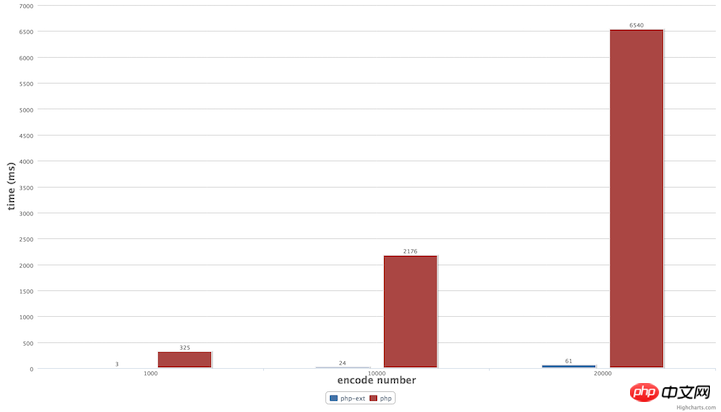PHP extension to generate unique string ID based on numbers
The content shared with you in this article is a PHP extension that generates a unique string ID based on numbers. It has a certain reference value. Friends in need can refer to it.
Hashids is a method that can generate unique string IDs. Non-sequential string ID numbers, it can also decrypt these IDs, you can use it to encrypt numeric IDs that you don't want to expose to users.
Installation
$ git clone https://github.com/cdoco/hashids.phpc.git $ cd hashids.phpc $ phpize && ./configure && make && make install
You can set some options in php.ini, or you can set them in the constructor, but I recommend you set them in php.ini so that you can have Better performance.
[hashids] extension=hashids.so //默认是空字符串 hashids.salt=cdoco //默认长度是 0 hashids.min_hash_length=20 //默认是 abcdefghijklmnopqrstuvwxyzABCDEFGHIJKLMNOPQRSTUVWXYZ1234567890 //你可以自己设置它,比如你使用全部小写的字符 hashids.alphabet=abcdefghijklmnopqrstuvwxyz
Quick Start
$hashids = new Hashids(); $hash = $hashids->encode(1, 2, 3, 4, 5); // ADf9h9i0sQ $numbers = $hashids->decode($hash); // [1, 2, 3, 4, 5] //或者你可以用静态方法调用 $hash = Hashids::encode(1, 2, 3, 4, 5); // ADf9h9i0sQ $numbers = Hashids::decode($hash); // [1, 2, 3, 4, 5]
Performance
Originally there was a function implemented by pure PHP code, now it is encapsulated into a PHP extension, and the performance is improved compared to the pure PHP version About a hundred times more

$hashids = new Hashids();
$hash = $hashids->encode(1, 2, 3, 4, 5); // ADf9h9i0sQ
$hash = $hashids->encode([1, 2, 3, 4, 5]); // ADf9h9i0sQ
Copy after login
Parameters of the construction method$hashids = new Hashids(); $hash = $hashids->encode(1, 2, 3, 4, 5); // ADf9h9i0sQ $hash = $hashids->encode([1, 2, 3, 4, 5]); // ADf9h9i0sQ
new Hashids(string $salt, int $min_hash_length, string $alphabet);
//example
new Hashids("this is salt.", 20, 'abcdefghijklmnopqrstuvwxyz');$hashids = new Hashids(); $hash = $hashids->encodeHex('FFFFDD'); // rYKPAK $hex = $hashids->decodeHex($hash); // FFFFDD
The above is the detailed content of PHP extension to generate unique string ID based on numbers. For more information, please follow other related articles on the PHP Chinese website!

Hot AI Tools

Undresser.AI Undress
AI-powered app for creating realistic nude photos

AI Clothes Remover
Online AI tool for removing clothes from photos.

Undress AI Tool
Undress images for free

Clothoff.io
AI clothes remover

AI Hentai Generator
Generate AI Hentai for free.

Hot Article

Hot Tools

Notepad++7.3.1
Easy-to-use and free code editor

SublimeText3 Chinese version
Chinese version, very easy to use

Zend Studio 13.0.1
Powerful PHP integrated development environment

Dreamweaver CS6
Visual web development tools

SublimeText3 Mac version
God-level code editing software (SublimeText3)

Hot Topics
 CakePHP Project Configuration
Sep 10, 2024 pm 05:25 PM
CakePHP Project Configuration
Sep 10, 2024 pm 05:25 PM
In this chapter, we will understand the Environment Variables, General Configuration, Database Configuration and Email Configuration in CakePHP.
 PHP 8.4 Installation and Upgrade guide for Ubuntu and Debian
Dec 24, 2024 pm 04:42 PM
PHP 8.4 Installation and Upgrade guide for Ubuntu and Debian
Dec 24, 2024 pm 04:42 PM
PHP 8.4 brings several new features, security improvements, and performance improvements with healthy amounts of feature deprecations and removals. This guide explains how to install PHP 8.4 or upgrade to PHP 8.4 on Ubuntu, Debian, or their derivati
 CakePHP Date and Time
Sep 10, 2024 pm 05:27 PM
CakePHP Date and Time
Sep 10, 2024 pm 05:27 PM
To work with date and time in cakephp4, we are going to make use of the available FrozenTime class.
 CakePHP File upload
Sep 10, 2024 pm 05:27 PM
CakePHP File upload
Sep 10, 2024 pm 05:27 PM
To work on file upload we are going to use the form helper. Here, is an example for file upload.
 CakePHP Routing
Sep 10, 2024 pm 05:25 PM
CakePHP Routing
Sep 10, 2024 pm 05:25 PM
In this chapter, we are going to learn the following topics related to routing ?
 Discuss CakePHP
Sep 10, 2024 pm 05:28 PM
Discuss CakePHP
Sep 10, 2024 pm 05:28 PM
CakePHP is an open-source framework for PHP. It is intended to make developing, deploying and maintaining applications much easier. CakePHP is based on a MVC-like architecture that is both powerful and easy to grasp. Models, Views, and Controllers gu
 CakePHP Creating Validators
Sep 10, 2024 pm 05:26 PM
CakePHP Creating Validators
Sep 10, 2024 pm 05:26 PM
Validator can be created by adding the following two lines in the controller.
 How To Set Up Visual Studio Code (VS Code) for PHP Development
Dec 20, 2024 am 11:31 AM
How To Set Up Visual Studio Code (VS Code) for PHP Development
Dec 20, 2024 am 11:31 AM
Visual Studio Code, also known as VS Code, is a free source code editor — or integrated development environment (IDE) — available for all major operating systems. With a large collection of extensions for many programming languages, VS Code can be c






